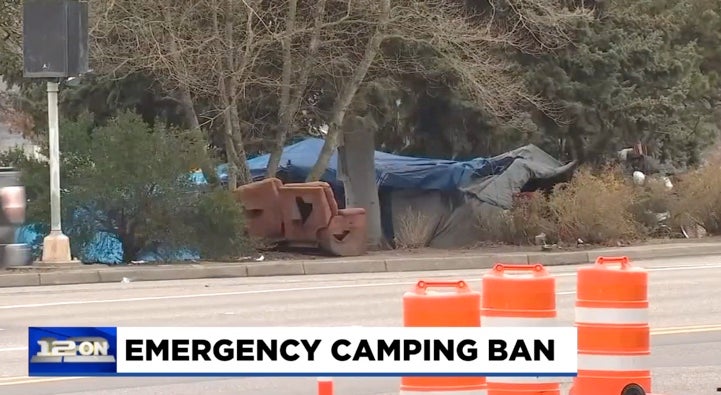Portland bans encampments near highways after 70% of pedestrian deaths were homeless people
‘We can no longer justify allowing our most vulnerable community members to be exposed to the dangers of camping in freeway and high-crash corridors,’ Mayor Ted Wheeler says

Your support helps us to tell the story
From reproductive rights to climate change to Big Tech, The Independent is on the ground when the story is developing. Whether it's investigating the financials of Elon Musk's pro-Trump PAC or producing our latest documentary, 'The A Word', which shines a light on the American women fighting for reproductive rights, we know how important it is to parse out the facts from the messaging.
At such a critical moment in US history, we need reporters on the ground. Your donation allows us to keep sending journalists to speak to both sides of the story.
The Independent is trusted by Americans across the entire political spectrum. And unlike many other quality news outlets, we choose not to lock Americans out of our reporting and analysis with paywalls. We believe quality journalism should be available to everyone, paid for by those who can afford it.
Your support makes all the difference.Portland has banned encampments close to the city’s highways after research showed that 70 percent of people killed in pedestrian traffic accidents last year were homeless.
Mayor Ted Wheeler signed an emergency order on Friday banning camping within a “dangerous proximity” to any state or federal highways or high-crash streets and intersections in the Oregon city.
Encampments found at these locations will be removed by the city’s Impact Reduction Program (IRP) Team and people currently camped there will be given information about available shelters.
There will be no right for people to return to these locations after the sites are cleared.
While the mayor admitted that a lack of beds and shelter space means the declaration will not tackle the wider issue of homelessness, he said that immediate action was needed to save lives.
“Our most vulnerable Portlanders are disproportionately affected by traffic-related injuries and deaths,” he said in a statement.
“We can no longer justify allowing our most vulnerable community members to be exposed to the dangers of camping in freeway and high-crash corridors.”
The order went into effect immediately and will stay in place until at least 18 February.
It comes off the back of the 2021 Vision Zero Traffic Crash Report which revealed that 19 out of 27 people killed in road traffic accidents in 2021 were homeless - with many of them camping close to high-crash areas.
It is unclear how many people are currently living in homeless encampments in the affected areas.
Mayor Wheeler said the camping ban only impacts about 8 percent of the city in the areas of the highest crashes and that he is working with Multnomah County to make 100 shelter beds available for some of those affected by the order.
In total, 2,037 people were unsheltered and living outside in Portland in 2019, according to the 2019 Point in Time Count, and the mayor’s declaration said it “is likely that the economic constraints of the pandemic have exacerbated the crisis”.
The mayor vowed that this was only the first of a number of steps to tackle homelessness in the city and has asked Governor Kate Brown to invest in opening more shelters in the city.
Subscribe to Independent Premium to bookmark this article
Want to bookmark your favourite articles and stories to read or reference later? Start your Independent Premium subscription today.



Join our commenting forum
Join thought-provoking conversations, follow other Independent readers and see their replies
Comments